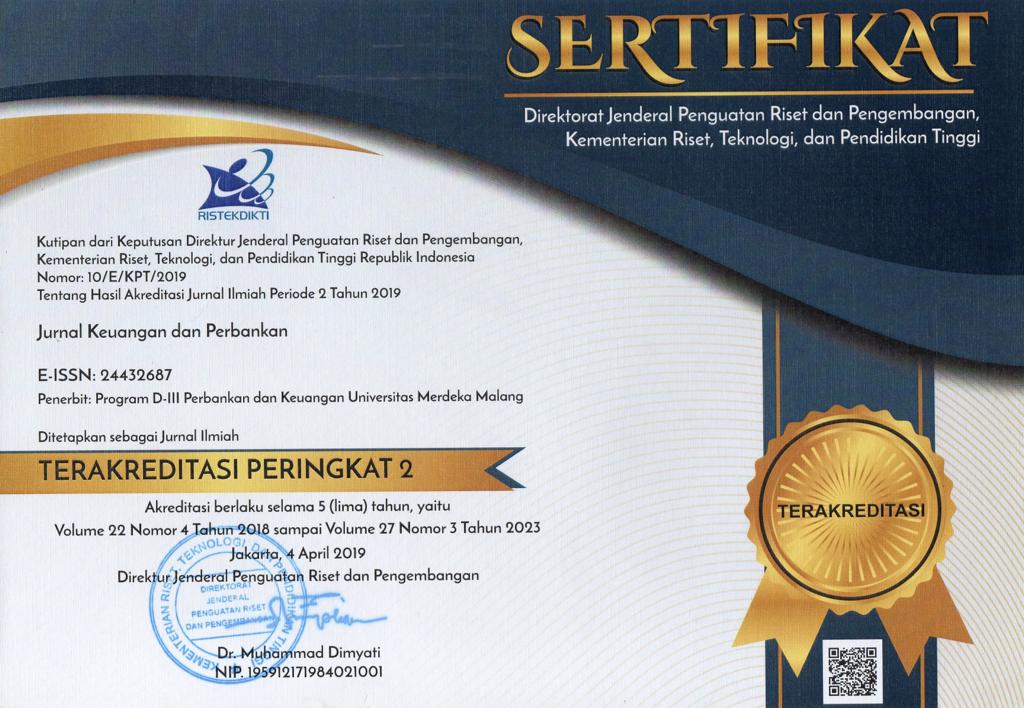The Influence of Tax Understanding, Tax Awareness and Tax Amnesty toward Taxpayer Compliance
Abstract
Taxpayer compliance is still an interesting topic to study since the government has launched tax amnesty program. This study aims at examining the influence of tax understanding, tax awareness and tax amnesty perceptions toward taxpayers’ compliance in East Semarang Pratama Tax Office, Semarang City, Central Java. The research population is taxpayers that are registered in East Semarang Pratama Tax Office. This study used convenience sampling as a sampling technique. This study used 200 (samples) units. Data collection technique used in this research is questionnaire which is developed from some previous studies. The writer then used descriptive statistical analysis and multiple linear regression analysis as the analysis method. The results of this study showed that the understanding of tax, taxpayer awareness and the perception of tax amnesty proved to have a positive and significant effect on taxpayer compliance. The taxpayer understanding and awareness become variables that have a stronger influence than a variable of tax amnesty perception. The other results indicate that gender can influence taxpayer compliance as well. Female taxpayers are more compliant than male taxpayers. It is then suggested that the tax office always enforce tax education programs to taxpayers regularly and continuously to increase the taxpayers’ understanding and awareness.
JEL Classification: H23; H26
Keywords
Full Text:
PDFReferences
Adiasa, N. (2013). Pengaruh pemahaman peraturan pajak terhadap kepatuhan wajib pajak dengan moderating preferensi risiko. Accounting Analysis Journal, 2(3), 345–352.
Agustiningsih, W., & Isroah. (2016). Pengaruh penerapan e-filing, tingkat pemahaman perpajakan, dan kesadaran wajib pajak terhadap kepatuhan wajib pajak di KPP Pratama Yogyakarta. Jurnal Nominal, V(2), 107–122.
Ananda. (2015). Faktor-faktor yang mempengaruhi kepatuhan wajib pajak dalam membayar pajak bumi dan bangunan dengan pendapatan masyarakat sebagai variabel moderating (Studi pada wajib pajak di Kota Medan). Tesis. Universitas Sumatera Utara.
Andinata, M. C. (2015). Analisis faktor-faktor yang mempengaruhi kepatuhan wajib pajak orang pribadi dalam membayar pajak (Studi kasus pada Kantor Pelayanan Pajak Pratama Surabaya Rungkut di Surabaya). Calyptra: Jurnal Ilmiah Mahasiswa Universitas Surabaya, 4(2), 1–15.
Andreas, & Savitri, E. (2015). The effect of tax socialization, tax knowledge, expediency of tax ID number and service quality on taxpayers compliance with taxpayers awareness as mediating variables. Procedia-Social and Behavioral Sciences, 211, 163–169. http://doi.org/10.1016/j.sbspro.2015.11.024
D’Attoma, J., Volintiru, C., & Steinmo, S. (2017). Willing to share? Tax compliance and gender in Europe and America. Research and Politics, April-June, 1–10. http://doi.org/10.1177/2053168017707151
Devano, S., & Rahayu, S. K. (2006). Perpajakan: Konsep, Teori, dan Isu. Jakarta: Kencana Prenada Media Group.
Fajriyan, N. A., Endang N. P., M. G. W., & Prasetya, A. (2015). Pengaruh persepsi pelaksanaan sensus pajak nasional, sikap wajib pajak pada pelaksanaan sanksi denda dan kesadaran perpajakan terhadap kepatuhan wajib pajak (studi pada wajib pajak orang pribadi di kelurahan Miji Kota Mojokerto). Jurnal Perpajakan (JEJAK), 1(1), 1–9.
Febriani, Y., & Kusmuriyanto. (2015). Analisis faktor-faktor yang mempengaruhi kepatuhan wajib pajak. Accounting Analysis Journal, 4(4), 1–13.
Gerger, G. Ç. (2012). Tax amnesty and tax compliance in Turkey. International Journal of Multidisciplinary Thought, 2(3), 107–113.
Ghozali, I. (2011). Aplikasi Analisis Multivariate dengan Program IBM SPSS 19. Semarang: BP UNDIP.
Gunarso, P. (2016). Pemeriksaan pajak dan sanksi pajak terhadap kepatuhan wajib pajak badan pada KKP Kepanjen Kabupaten Malang. Jurnal Keuangan dan Perbankan, 20(2), 214–223.
Hardiningsih, P., & Yulianawati, N. (2011). Faktor-faktor yang mempengaruhi kemauan membayar pajak. Dinamika Keuangan dan Perbankan, 3(1), 126–143.
Ilhamsyah, Endang, M. G. W., & Dewantara, R. Y. (2016). Pengaruh pemahaman dan pengetahuan wajib pajak tentang peraturan perpajakan, kesadaran wajib pajak, kualitas pelayanan, dan sanksi perpajakan terhadap kepatuhan wajib pajak kendaraan bermotor (Studi Samsat Kota Malang). Jurnal Perpajakan (JEJAK), 8(1), 1–9.
Junpath, S. V, Kharwa, M. S. E., & Stainbank, L. J. (2016). Taxpayers’ attitudes towards tax amnesties and compliance in South Africa: An exploratory study. South African Journal of Accounting Research, 30(2), 97-119. http://doi.org/10.1080/10291954.2015.1070565
Mangoting, Y., & Sadjiarto, A. (2013). Pengaruh postur motivasi terhadap kepatuhan wajib pajak orang pribadi. Jurnal Akuntansi dan Keuangan, 15(2), 106–116. http://doi.org/10.9744/jak.15.2.106-116
Marino, M. R., & Zizza, R. (2012). Personal Income Tax Evasion in Italy: An Estimate By Taxpayer Type in: Tax Evasion and The Shadow Economy. Cheltenham, UK: Edward Elgar Publishing.
Muslichah. (2015). The effect of tax simplification on taxpayers’ compliance behavior: Religiosity as moderating variable. Jurnal Keuangan dan Perbankan, 19(1), 98–108.
Ngadiman, & Huslin, D. (2015). Pengaruh sunset policy, tax amensty, dan sanksi pajak terhadap kepatuhan wajib pajak (Studi empiris di Kantor Pelayanan Pajak Pratama Jakarta Kembangan). Jurnal Akuntansi, XIX(2), 225–241.
Nugroho, A., Andini, R., & Raharjo, K. (2016). Pengaruh kesadaran wajib pajak dan pengetahuan perpajakan wajib pajak terhadap kepatuhan wajib pajak dalam membayar pajak penghasilan (studi kasus pada KPP Semarang Candi). Journal of Accounting, 2(2), 1–13.
Nurhayati, N., Halimatusadiah, E., & Diamonalisa. (2015). Influence of tax officer service quality and knowledge of tax on individual taxpayer compliance in tax office (KPP) Bojonagara Bandung. International Journal of Applied Research, 1(8), 805–809.
Oladipupo, A. O., & Obazee, U. (2016). Tax knowledge, penalties, and tax compliance in small and medium scale enterprises in Nigeria. iBusiness, 8(March), 1–9. http://doi.org/http://dx.doi.org/10.4236/ib.2016.81001
Olaoye, C. O., Ayeni-agbaje, A. R., & Alaran-ajewole, A. P. (2017). Tax information, administration, and knowledge on taxpayers’ compliance of Block Moulding Firms in Ekiti State. Journal of Finance and Accounting, 5(4), 131–138. http://doi.org/10.11648/j.jfa.20170504.12
Palil, M. R., Rusyidi, M. A., & Ahmad, W. F. bin W. (2013). The perception of taxpayers on tax knowledge and tax education with level of tax compliance: A study the influences of religiosity. ASEAN Journal of Economics, Management, and Accounting, 1(1), 118–129.
Rahayu, S. K. (2013). Perpajakan Indonesia: Konsep dan Aspek Formal. Yogyakarta: Graha Ilmu.
Rechberger, S., Hartner, M., Kirchler, E., & Hämmerle, F. (2010). Tax amnesties, justice perceptions, and filing behavior: A simulation study. Law Policy, 32(2), 214–225. http://doi.org/10.1111/j.1467
Redae, R. B., & Sekhon, S. (2016). Taxpayers’ knowledge and tax compliance behavior in Ethiopia: A study of Tigray State. International Journal of Management and Commerce Innovations, 3(2), 1090–1102.
Robbins, S. P. (2002). Prinsip-prinsip Perilaku Organisasi (Kelima). Jakarta: Erlangga.
Saad, N. (2014). Tax knowledge, tax complexity, and tax compliance: Taxpayers ’ view. Procedia - Social and Behavioral Sciences, 109, 1069–1075. http://doi.org/10.1016/j.sbspro.2013.12.590
SaraÇoĞlu, O. F., & ÇaŞkurlu, E. (2011). Tax amnesty with effects and effecting aspects: Tax compliance, tax audits, and enforcement around; The Turkish case. International Journal of Business and Social Science, 2(7), 95–103.
Savitri, E., & Musfialdy. (2016). The effect of taxpayer awareness, tax socialization, tax penalties, compliance cost at taxpayer compliance with service quality as mediating variable. Procedia - Social and Behavioral Sciences, 219, 682–687. http://doi.org/10.1016/j.sbspro.2016.05.051
Sugiyono. (2016). Metode Penelitian Pendidikan, Pendekatan Kuantitatif, Kualitatif, dan R&D. Bandung: Alfabeta.
Suryarini, T., & Tarmudji, T. (2009). Pengetahuan Perpajakan. Semarang: UNNES Press.
Suyanto, Intansari, P. P. L. A., & Endahjati, S. (2016). Tax amnesty. Jurnal Akuntansi, 4(2), 9–22.
Wahyudin, A. (2015). Metodologi Penelitian. Semarang: UNNES Press.
Widodo, W. (2010). Moralitas, Budaya dan Kepatuhan Pajak. Bandung: Alfabeta.
Yee, C. P., Moorthy, K., & Choo, W. S. K. (2017). Taxpayers’ perceptions on tax evasion behaviour: An empirical study in Malaysia. International Journal of Law and Management, 59(3), 413–429. http://doi.org/10.1108/IJLMA-02-2016-0022
DOI: https://doi.org/10.26905/jkdp.v22i2.1678
Refbacks
- There are currently no refbacks.
Jurnal Keuangan dan Perbankan (Journal of Finance and Banking)
Diploma Program of Banking and Finance, Faculty of Economics and Business, University of Merdeka Malang
Published by University of Merdeka Malang
Mailing Address:
2nd floor Finance and Banking Building, Jl. Terusan Raya Dieng No. 57 Malang, East Java, Indonesia
Phone: +62 813-3180-1534
Email: jkp@unmer.ac.id
 This work is licensed under a Creative
This work is licensed under a Creative
Commons Attribution-ShareAlike 4.0




